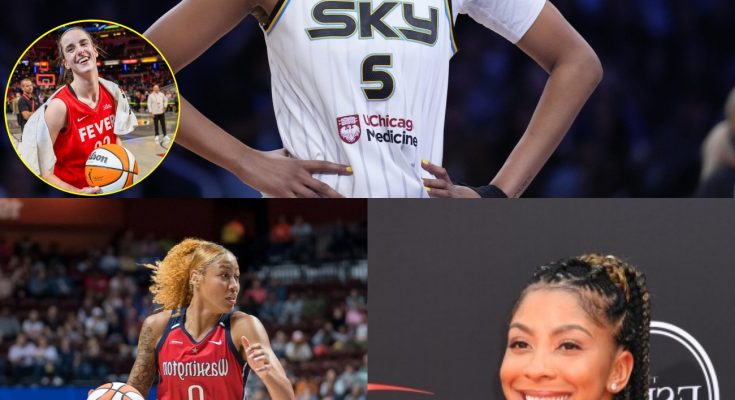In the world of professional sports, the box score can be a deceptive narrator. It can tell a story of individual brilliance, of points scored and rebounds grabbed, but it often fails to capture the most crucial element of team sports: impact. For Chicago Sky’s Angel Reese, the box score has become both her shield and her Achilles’ heel. While she consistently fills her stat sheet with impressive double-doubles, her team is languishing, and a recent, humiliating loss to the Washington Mystics, followed by a public critique from a WNBA legend, has shattered the illusion of her superstardom, revealing a player whose individual achievements may be nothing more than “empty noise” in a sea of team dysfunction.

The Sky’s 103-86 loss to the Mystics was not just a defeat; it was an indictment. Reese finished the game with a respectable 22 points and 13 rebounds, numbers that, in a vacuum, suggest a dominant performance. But the reality of the game told a different story. The Sky, a team with a roster of seasoned veterans, were systematically dismantled by a pair of rookies. The Mystics’ Sonia Citron and Kiki Irari made WNBA history, becoming the first rookie duo in their franchise’s history to each score over 20 points in the same game. They were poised, efficient, and, most importantly, they played winning basketball.
Meanwhile, the Sky’s defense, supposedly anchored by Reese in the paint, was a sieve. They surrendered a staggering 52 points inside, a clear testament to a lack of cohesion and defensive will. The most telling and deeply embarrassing moment of the night came when Mystics’ center Shakira Austin scored on Reese and then, in a brazen act of on-court dominance, taunted her with the universally recognized “too small” gesture. It was a moment of pure humiliation, broadcast on live television and amplified by the game’s commentators. This wasn’t just a physical defeat; it was a psychological one.

The loss, and the nature of it, has intensified the debate surrounding Reese’s actual value. Her supporters point to her individual accolades and impressive statistics as proof of her elite status. But her detractors point to the Chicago Sky’s dismal 7-19 record and ask a simple, damning question: What is the point of a double-double if it doesn’t translate to wins? Head Coach Tyler Marsh’s post-game comments about the team’s inability to protect the paint, while not naming Reese directly, were a clear criticism of his star center’s defensive performance.
The on-court humiliation was soon followed by a professional reckoning. WNBA legend and future Hall of Famer Candace Parker, on her widely respected podcast, delivered a blunt and unvarnished assessment of Reese’s game. She ranked Reese as a “C-tier” player, a classification that, while seemingly harsh, was rooted in a deep understanding of the game. Parker praised Reese for being “fantastic in her role,” specifically highlighting her elite offensive rebounding. But she was unequivocal in her assertion that Reese is not a primary offensive option and is not capable of carrying a team to victory. It was a critique based not on personal animus, but on a professional evaluation of her skillset and impact.
:max_bytes(150000):strip_icc():focal(749x0:751x2)/caitlin-clark-tout-090424-36ec761043bb46ae88e0c96fcbfdd77a.jpg)
Reese’s response was, predictably, not one of introspection, but of deflection and drama. She took to social media with a cryptic post, accusing Parker of “clout chasing.” It was a move that betrayed a startling lack of self-awareness, a knee-jerk reaction from a player who appears to have been convinced by her own fanbase that she is engaged in a “rivalry” with one of the game’s all-time greats. This “one-sided beef,” as it’s been called, is a perfect encapsulation of the problem with the Angel Reese experience: a focus on personal brand and social media battles over professional growth and team success.
This narrative stands in stark contrast to that of her contemporary, Caitlin Clark. While Reese is embroiled in Twitter feuds, Clark is quietly and effectively transforming the Indiana Fever. Clark’s impact is not just measured in her own impressive stats, but in the elevated play of her teammates. She is a true floor general, a player who makes everyone around her better. The conversation around Clark is about building a championship foundation, about leadership, and about a genuine love for the game. The conversation around Reese, increasingly, is about stat padding, social media drama, and a toxic “me-first” attitude.
Players like Aaliyah Boston and Lexi Hull, who exhibit a quiet professionalism and a relentless focus on team success, provide a further contrast. They understand that basketball is a team game, that individual glory is hollow without collective achievement. This is the lesson that Angel Reese, for all her talent, has yet to learn.
The unraveling of the Angel Reese superstar illusion is a cautionary tale for the modern athlete. In an era of personal branding and social media metrics, it is easy to confuse online popularity with on-court impact. But the unforgiving scoreboard and the discerning eyes of legends like Candace Parker tell a different story. Individual stats, without the foundation of team success, are ultimately just empty noise. Real talent, the kind that builds legacies and wins championships, is measured not in double-doubles, but in the quiet, undeniable act of making your team better. Until Angel Reese embraces that fundamental truth, she will remain a star in her own social media feed, but a “C-tier” player on the court where it truly matters.

